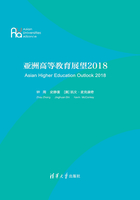
Chapter 7 Strengthening the Scholarship in Asian Higher Education Studies
As research in Asian higher education advances, it is important to keep abreast of the main areas and emerging trends of development. Asian based higher education research exhibits multiple characteristics over the past two decades: rapid growth in academic publications; multidisciplinary approaches with social sciences as a strong focus; multiple channels to publish in a range of journals, with the majority of journals with broad scope not confined to higher education or Asia; a dozen or so prominent researchers with focused publications over the years; a broader array of over 160 researchers across 120 countries who publish sporadically in the field; and, East Asia is both a focus of research and a major source of researchers.
Asian based higher education research contains four major areas of research. A long-time research focus concerns the education status of people and of universities. The former explores the impact of higher education on human development in Asia, in terms of physical, mental or socio-economic conditions of people. The latter examines how Asian universities at institutional, municipal and national levels have raised their international status in terms of capacity, competitiveness or reputation.
A recent and popular area of research is world-class university studies. This area studies the nature and characteristics of internationalization of higher education in Asia, with special reference to world-class university creation. One important sub-area is university rankings research that evaluates the strategies, performance, impact and methodologies of world university rankings. Another major sub-area is academic mobility and global citizenship studies that highlights a people-centered approach to the identity and experience of students, faculty and staff in internationalization.
With regard to theoretical innovation, an emergent research front is urban geographic studies of the university-city relationship. It explores the interconnected and often interdependent development processes of the university and the city, with special references to the interactions with and impact on each other in the process of internationalizations and globalization.
With regard to methodological innovation, an emergent research front is bibliometric and scientometric studies to evaluate university performance in research, innovation and collaboration. Such studies can assist AUA to “discover itself”, as well as to create a collective identity through critical self-examination and proactive communication of AUA's core strength and characteristics. Such evidencebased analysis can also help AUA to make well-informed decisions towards its objectives.
The study of Asian higher education as a whole is valuable but challenging. This Report advocates a more coordinated and cohesive comparative research in Asianhigher education. Such research would offer significant potential to advance the understanding of Asia and to address complex local and global issues through knowledge sharing.